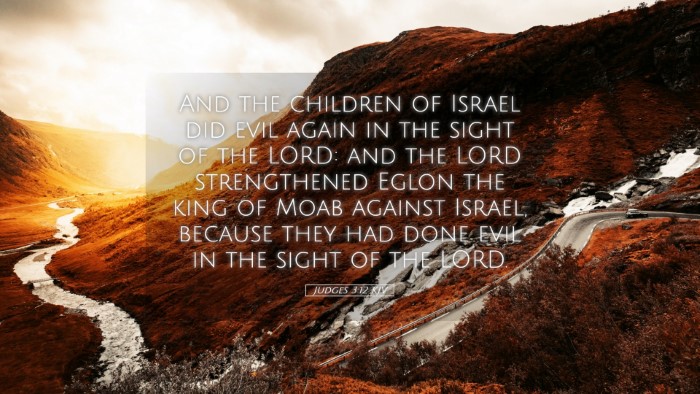Judges 3:12 Commentary
Verse: “And the children of Israel did evil again in the sight of the Lord; and the Lord strengthened Eglon the king of Moab against Israel, because they had done evil in the sight of the Lord.” (Judges 3:12)
Introduction
The book of Judges is marked by cycles of sin, oppression, repentance, and deliverance. Judges 3:12 encapsulates Israel's recurrent disobedience and the consequent divine judgment, serving as a stark reminder of the covenant relationship between God and His chosen people.
Theological Themes
-
The Cycle of Sin:
Matthew Henry notes that the phrase “did evil again” emphasizes the continual backsliding of the Israelites, highlighting the inexorable pattern of sinning, suffering, supplication, and salvation that prevails throughout the book. This verse marks a pivotal moment in Israel's desperate need for deliverance.
-
Divine Sovereignty:
Albert Barnes points out that God’s act of strengthening Eglon, king of Moab, reflects His sovereign control even over foreign nations. This does not imply that God endorses evil, but rather that He uses even wicked rulers to execute His judgment against a wayward people.
-
God's Judgments:
Adam Clarke emphasizes that God’s strengthening of Eglon represents a punishment in response to Israel’s infidelity. It shows how God’s justice operates in allowing sin to bring forth its own consequences, reinforcing the notion that God's patience with sin has its limits.
Historical Context
The period of the Judges was characterized by a lack of centralized governance, leading to moral and spiritual decay among the Israelites. The Moabites, a recurrent foe, symbolize the external pressures that arose when Israel turned away from God. This verse signifies not just a spiritual failing but also a socio-political crisis.
Interpretative Insights
-
Nature of Evil:
Henry elucidates that the term “evil” encompasses a wide array of actions contrary to God's laws, reflecting moral degradation. The focusing on the “sight of the Lord,” stresses the omnipresence of God’s awareness of Israel’s transgressions.
-
Conditional Blessings:
Barnes elucidates the idea that Israel's blessings were contingent upon their faithfulness to God. Their turn to evil invites corrective measures from God, illustrating His commitment to maintain holiness among His people.
-
Human Responsibility:
Clarke discusses the balance of divine sovereignty and human responsibility. While God permits judgment, the responsibility lies with the people for their choice to stray from His commandments and to engage in idolatry and immorality.
Practical Applications
-
The Consequences of Disobedience:
This verse serves as a sobering reminder for contemporary readers regarding the nature of sin and its repercussions. It calls leaders and congregants alike to reflect on their commitments to God and the seriousness of their spiritual walk.
-
The Importance of Repentance:
The cyclical nature of sin demonstrated in Judges underscores the necessity of genuine repentance. As Israel cycled through oppression and deliverance, so too should believers today seek to return to God before falling into patterns that lead away from His presence.
-
Hope Amidst Judgment:
While this verse outlines God’s judgment, it also points to God’s unwillingness to abandon His people entirely. Therein lies hope, as eventual deliverance follows repentance. Promoting a narrative of redemption remains crucial for pastoral care and theological teaching.
Conclusion
Judges 3:12 vividly illustrates the consequences of turning away from God's ways and the dynamics of His governance among nations. By reviewing the insights from Henry, Barnes, and Clarke, we gain an enriched understanding that is theological, historical, and practical. As it beckons to past and contemporary believers, it reinforces the relevance of covenant fidelity in our relationship with God.


